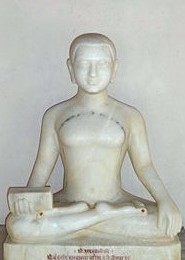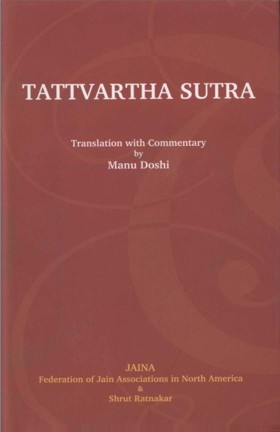01.04 Jeevājeevāsravbandhsamvarnirjarārnokshāstattvam
Audio: Sanskrit: Hindi: English: Soul, lifeless matter, incoming of Karma, bondage, prevention, eradication and liberation constitute the categories of truth.
This sutra specifies Jeev (Soul), Ajeev (Lifeless matter), Asrav (Incoming of Karma), Bandh (Bondage), Samvar (Prevention of Karma), Nirjarā (Eradiation of bondage) and Moksha (Liberation) as the main aspects that constitute truth. Of those seven aspects, the first two, soul and lifeless matter, are most vital. There are several lifeless substances, but we are mainly concerned with Pudgal (tangible matter), which is the only substance the soul can interact with. The soul has infinite capabilities. It is inherently imbibed with them. But being unaware of that, the worldly soul interacts with the lifeless matter in pursuit of happiness. That interaction leads to bondage of Karma. How that bondage occurs, how to prevent it and to get freed from the same is the subject matter of spiritual science. In that context we need to consider the remaining five aspects.Asrav and Bandh: By virtue of indulgence in attachment or aversion for the situations that arise from time to time, Karma particles are prompted to penetrate within the provinces of soul. That penetration is termed as Asrav, which means incoming of Karma. The Karma particles are then bound to the provinces of soul. That binding is termed as Bandh or bondage. That lasts for a short or long period depending upon the intensity of attachment or aversion at the time of acquiring the bondage.
Samvar and Nirjarā: When one realizes that his indulgence is unbecoming, he tries to remain unaffected by any situation. That prevents the penetration of Karma particles. Such prevention is termed as Samvar. But mere prevention is not enough. One also needs to get rid of the particles, which have already penetrated and formed the bondage. In other words, he has to eradicate the bondage of Karma. That eradication is termed as Nirjarā. The difference between Samvar and Nirjarā can be explained by the analogy of cleaning a house. If one wants to clean it, he first needs to close the doors and windows through which the dirt and other garbage might come in. Thereafter he has to remove the accumulated garbage with a broom or a vacuum cleaner. The closing of the doors and windows is analogous to Samvar, while removal of the accumulated garbage is analogous to Nirjarā.
Moksha: The existing bondage of Karma is eradicated by undertaking Nirjarā and the inflow of new Karma particles is prevented by resorting to Samvar. Thereby one can attain the Karmaless state, the state where the soul is completely free from all the lifeless particles. That itself is termed as Moksha (liberation).
It would be noticed that this sutra does not specify Punya (wholesome activity) and Pap (unwholesome activity) as vital aspects and enumerates seven Tattvas (fundamentals) in all. That is the Digambar tradition, which considers Punya and Pap as implicit in Asrav. As such, they specify seven Tattvas instead of nine as per Shwetāmbar tradition. But whether Punya and Pap are separately mentioned or not, they are to be reckoned with. Specifying them as seven or nine does not therefore make real difference.
 Acharya Umaswati
Acharya Umaswati
